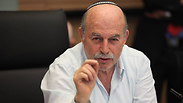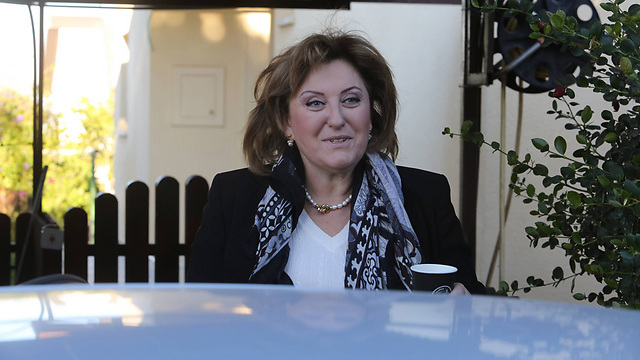
Finance Committee Chairman Nissan Slomiansky
Photo: Gil Yohanan

Amnon Abramovich
Photo: Channel 2
On the eve of the government's establishment, Economy Minister Naftali Bennett promised that there would be no more coalition funds.
There was one person who was unimpressed and unconvinced: His No. 2 in the Bayit Yehudi party, Construction Minister Uri Ariel.

Bennett condemned the phenomenon of these political funds vehemently and firmly. He wrote it on Facebook and stated it in public. He sounded convincing and the things he said were definitely impressive.
Money and Power
'While trial involving Netanyahu has been moved because of elections, investigation into our party has been put on fast track,' Yisrael Beiteinu chairman says in attempt to depict corruption investigation as political.
About a year ago, Ariel gave an interview to a leaflet called Shvii, which is distributed in synagogues across the country. In that interview, Ariel boasted: "We brought into the yeshiva world NIS 120 million (about $30 million) in coalition funds and we will bring more."
The Knesset's Finance Committee is the state's biggest conversion system. The state budget is handed over to the committee like a newborn baby and undergoes a proper conversion process there.
When the committee is headed by an ultra-Orthodox Knesset member, the funds are channeled to haredi bodies and goals. MK Moshe Gafni of the United Torah Judaism faction once said proudly, on the record, that when the government decided to apply across-the board budget cuts to all of its ministries, "I took the decision to cut NIS 350 million from the world of Torah and threw it in the garbage."
When the committee is headed by a settler MK, like Nissan Slomiansky, the funds are channeled to the settlement enterprise. The money is subtracted from encouraging employment in the periphery, from daycare centers, from the elderly.

Deputy Minister Fania Kirshenbaum. 'Those who will be prosecuted and found guilty will be punished. But the system itself will keep blossoming and we will keep screaming' (Photo: Gil Yohanan)
The definition of the goals is creative and diverse: Encouraging a young settlement, a "Garin Torani" (a group of religious Zionist individuals and families who try to effect social and religious development in underdeveloped communities) or fortifying vehicles. MK Elazar Stern, a retired general, asked in one of the meetings how many layers of Perspex does each car need.
The committee also approved at the time millions of shekels for "spiritual ties with the Diaspora." What kind of ties, Stern asked. Spiritual, they answered him. Through who, he asked. Through associations, they replied. Stern, who was a new and fresh lawmaker at the time, turned to the Knesset's legal advisor.
And we have yet to mention the Settlement Division, which is the most offensive division in the Land of Israel's army of funds.
Once these funds were called "unique." At the end of each year, a long line would form at the Knesset's corridors, opposite the Finance Committee. Until the High Court of Justice came and ruled that things must be uniform and equal. That's didn't help either. The ruling was bypassed.
Attorney Amnon de Hartog was head of the Justice Ministry's support unity. A concerned civil servant. So concerned that he once slapped a haredi Knesset member from United Torah Judaism.
Attorney de Hartog was pedantic about spending support funds. The haredi politician was pedantic about pumping funds for associations. He said to de Hartog, "You are worse than the Germans, than the Nazis." De Hartog, the son of Holocaust survivors, couldn’t tolerate the provocation and slapped him.
After Shas Chairman Aryeh Deri was convinced in his personal case at the Jerusalem District Court, he was prosecuted in Jerusalem's Magistrates Court in what was known at the time as "the public case." Deri was accused of transferring funds to haredi bodies in a conflict of interests and violation of the support procedure.
The public case included five charges. Deri was fully acquitted of four of them and convicted of one. He was convicted in a case called Kol Yehuda, an association which was headed by his brother Yehuda. The voice was Yehuda's voice, but the hands which transferred money from one brother to another were Aryeh's hands.
After the acquittal, Deri said: "Today it was proven that I made acceptable and proper use of a years-long procedure, that it was affirmative action. Our policy was supported by the court," he stated. "In the end, our way will win."
The police suspect that Deputy Minister Fania Kirshenbaum contains three Aryeh Deris in one woman: His personal criminal case, the criminal part of the public case, and the non-criminal part of the administrative case.
The suspects in this affair include many members of Avigdor Lieberman's Bayit Yehudi party, and some from the Likud and Bayit Yehudi. They are excellent people, their friends say in their defense, people of virtues.
These are argumentations of punishment. Neither preliminary argumentations nor argumentations defending the system. Those of them who will be prosecuted and found guilty will be punished. But the system itself will keep blossoming and we will keep screaming.
Amnon Abramovich is a Channel 2 News commentator.
















